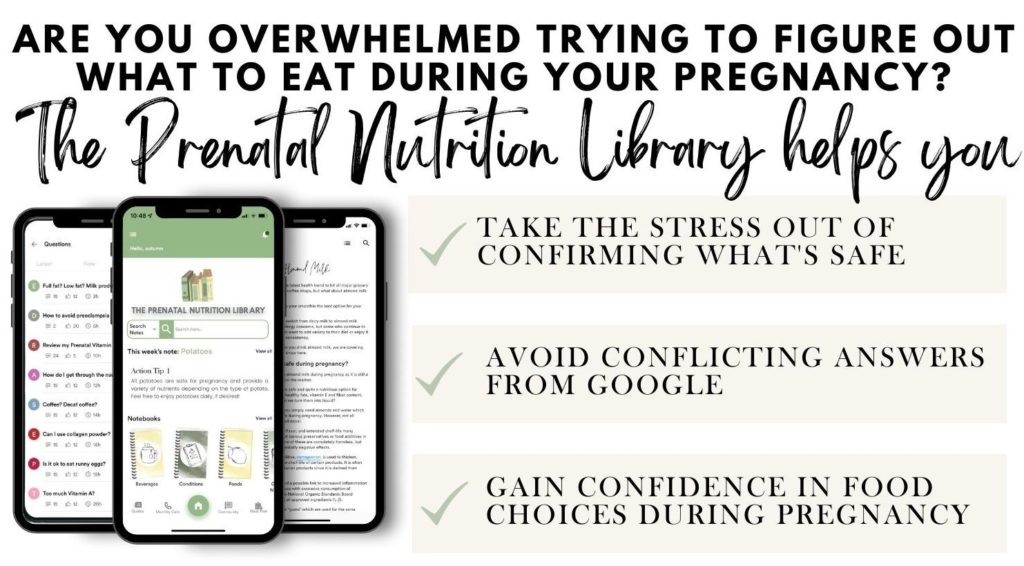The benefits of consuming seafood during pregnancy are well-researched and cannot be overemphasized. Seafood is a good source of several essential nutrients like vitamins A and D, omega-3 fatty acids, and protein that offer numerous health benefits for both mom and the developing baby. However, with the wide array of seafood options available, I’m commonly asked by expectant mothers which ones are safe to consume during pregnancy.
In today’s post, I’m shedding light on the topic of eating crab during pregnancy and providing valuable insights to help you make informed choices. Let’s delve into the benefits, safety tips, and considerations surrounding crab consumption during pregnancy!
> Have a specific question about nutrition during pregnancy? Wondering if it’s safe to consume a certain food?? Sign up for The Prenatal Nutrition Library, where you can ask all your important questions and gain access to our private podcast, meal plans, and SO MUCH MORE! See you there!
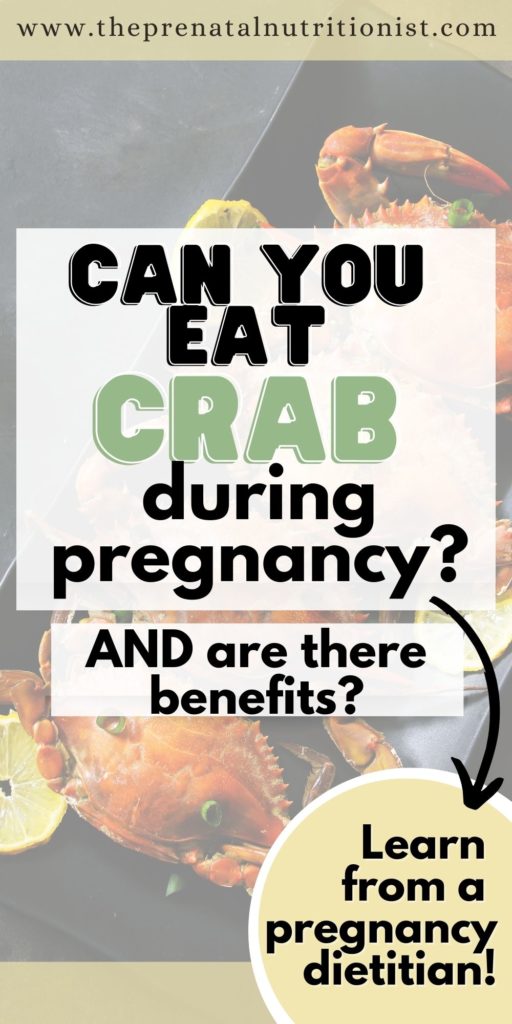
Can You Eat Crab While Pregnant?
Yes – you can eat crab while pregnant, but there are some important considerations to note.
The good news is that crab is generally safe for expectant mothers when consumed in moderation and cooked to recommended temperatures. Crab contains low levels of mercury, making it a safer seafood option compared to some larger high-mercury fish. An average-sized crab typically contains around 0.09 parts per million (ppm) of mercury, which is well within the acceptable limit for consumption during pregnancy. However, the amount of mercury will vary depending on the type of crab and its habitat.
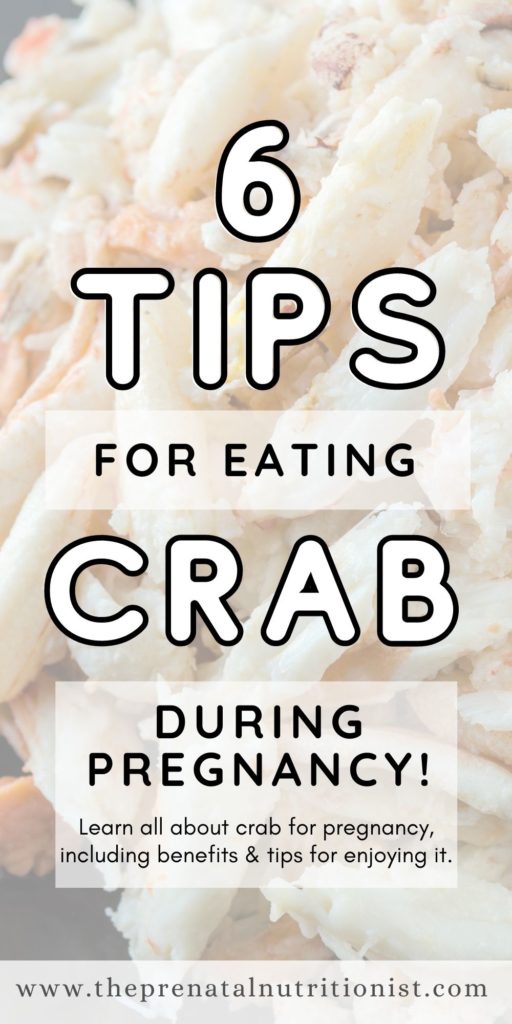
Tips on How to Eat Crab While Pregnant:
Eat in moderation
The current seafood recommendations are to limit intake to up to 12 ounces per week of low-mercury seafood choices. I do think these guidelines should be reevaluated as we know cultures outside of the United States eat much more seafood than this and have very healthy pregnancies. In addition, research shows positive outcomes with more seafood intake despite higher mercury levels. Either way, it’s always a good idea to consume a variety of protein sources to get a variety of other nutrients, too.
Only consume properly cooked crab
Pregnant women should only consume crab that is thoroughly cooked to reduce the risk of foodborne illnesses. Proper cooking kills harmful bacteria and parasites. The USDA recommended minimum internal cooking temperature for seafood is 145 F.
Choose low-mercury varieties
Pregnant women should avoid high-mercury seafood choices. Instead, opt for crab species that are low in mercury, such as blue crab, snow crab, Dungeness, or king crab. Many commonly consumed crab varieties have relatively low mercury levels compared to larger predatory fish.
Crabs can be eaten in any trimester of pregnancy
Consuming crab is safe for preconception and all trimesters of pregnancy. Despite popular myths and rumors, seafood does not need to be avoided in the first trimester of pregnancy.
Avoid raw crab
Pregnant women should steer clear of raw crab or any uncooked shellfish to minimize the risk of food poisoning and other foodborne illnesses. Always choose thoroughly cooked crab dishes.
Crab legs and crab claws
Pregnant women are not limited to lump crab meat or the crab meat that comes from the body of the crab. Crab legs and crab claw meat are safe to eat and incorporate as part of a varied and balanced meal plan for pregnancy too. Again, just be sure it is fully cooked before eating.
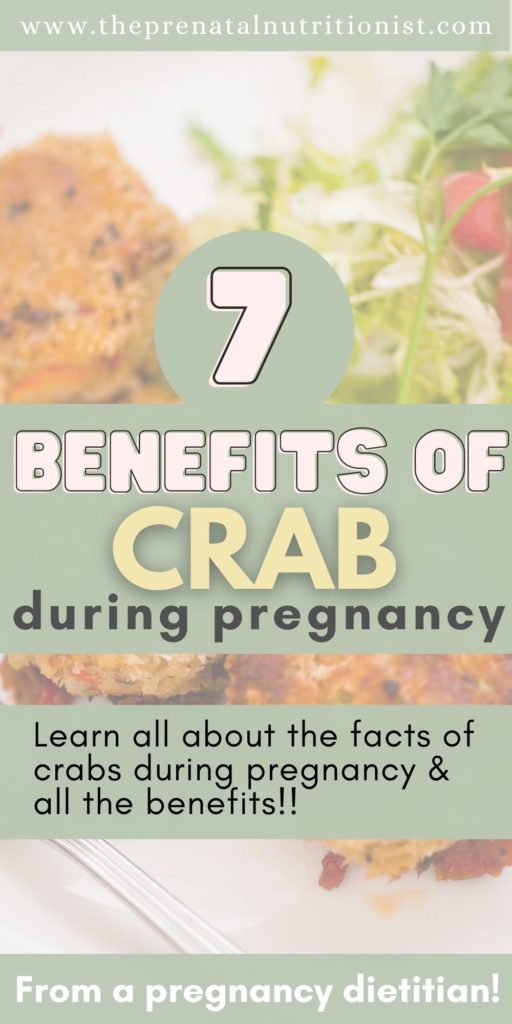
Benefits Of Eating Crab During Pregnancy
1. Good source of protein
During pregnancy, protein plays a crucial role in the growth and development of the baby. Crab meat is a fantastic source of high-quality protein, providing essential amino acids necessary for the formation of the baby’s tissues and organs. Protein also aids in repairing and building new cells, supporting the expectant mother’s overall health during this transformative phase.
Looking for other protein sources during pregnancy that aren’t meat? Check out these vegetarian options!
2. Omega-3 fatty acids for brain development
Crab is a notable source of omega-3 fatty acids, including DHA (docosahexaenoic acid), which is vital for the development of the baby’s brain and nervous system. DHA plays a key role in cognitive development and visual acuity in the baby. Additionally, these healthy fats contribute to reducing inflammation and promoting cardiovascular health for the mom.
There are several foods and nutrients that support baby’s brain development. Check out our list of foods for the baby’s brain HERE.
3. Abundant in vitamins and minerals
Crab meat is packed with essential vitamins and minerals that support a healthy pregnancy. It is a rich source of vitamin B12, which is critical for the formation of red blood cells and for maintaining proper nerve function. Vitamin B12 also aids in energy production, which can help combat pregnancy fatigue.
4. Immune system support
During pregnancy, the immune system is slightly suppressed. Crab contains essential nutrients like zinc, selenium, and vitamin C, which can help support the health of the immune system. Supporting and optimizing immune health during pregnancy can help to protect or reduce the risk of infections and illness for the mother and baby. Find more tips on building a strong immune system during pregnancy HERE.
5. Versatile and flavorful
Crab is a nutrient-dense food that can be eaten in a variety of ways to create healthy meals for pregnancy. Seafood tacos, frittatas, soups, sandwiches, pasta dishes, crab cakes, and salads are all great examples of dishes that could incorporate crab meat in a satisfying and delicious way.
6. Beneficial minerals for bone health
Crab is a source of several minerals, including calcium, phosphorus, and magnesium, which are vital for maintaining strong and healthy bones. These minerals are essential for the baby’s skeletal development and can also support the mother’s bone health during pregnancy.
7. Iron content for anemia prevention
Consuming enough iron is crucial during pregnancy to prevent iron-deficiency anemia, a condition characterized by low red blood cell count. Crab meat contains iron to boost intake and help meet needs. Iron is needed to ensure adequate oxygen supply to the baby and supports the mother’s energy levels.
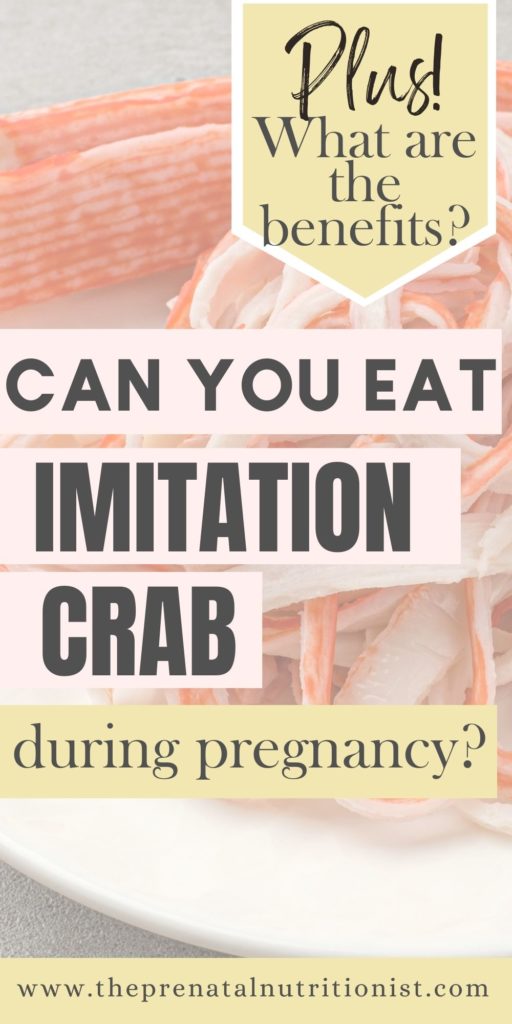
Can You Eat Imitation Crab While Pregnant?
Imitation crab, also known as surimi, is a seafood product that is made to resemble the taste and texture of real crab meat. It is made by blending minced fish, typically white fish like pollock or whiting, with starch, egg whites, and various flavorings. Imitation crab can be a convenient and affordable option. It is cooked and safe for pregnant women to consume during all trimesters of pregnancy.
Imitation crab has a different nutrition profile and content than real crab because there’s no actual crab in imitation crab. Real crab offers a more robust nutrient profile than imitation crab. While it does contain some protein, imitation crab lacks the benefit of having high amounts of nutrients like vitamin B12 and omega-3 fatty acids. It can be incorporated but is not a replacement for high-quality seafood choices!
Things to Know Before Eating Imitation Crab During Pregnancy:
Nutritional value:
Imitation crab is generally a good source of protein. However, as mentioned above, the overall nutrient profile is different than real crab. It is not a great source of nutrients like vitamin B12 and omega-3 fatty acids.
Added sugar and artificial flavors:
Imitation crab often contains added sugar and artificial flavors. Sugar is added to enhance the flavor and mimic the taste of real crab. The amount of added sugar varies depending on the brand. Check out the nutrition facts and be mindful of overall added sugar intake.
Mercury content:
One advantage of imitation crab is that it is typically made from low-mercury fish like pollock. The fact that it is cooked and contains low-mercury fish is what makes it a safe choice during pregnancy.
Allergies and sensitivities:
Pregnant women with seafood allergies or sensitivities should exercise caution when consuming imitation crab. While it may not contain real crab allergens, other ingredients in the product could trigger allergic reactions.
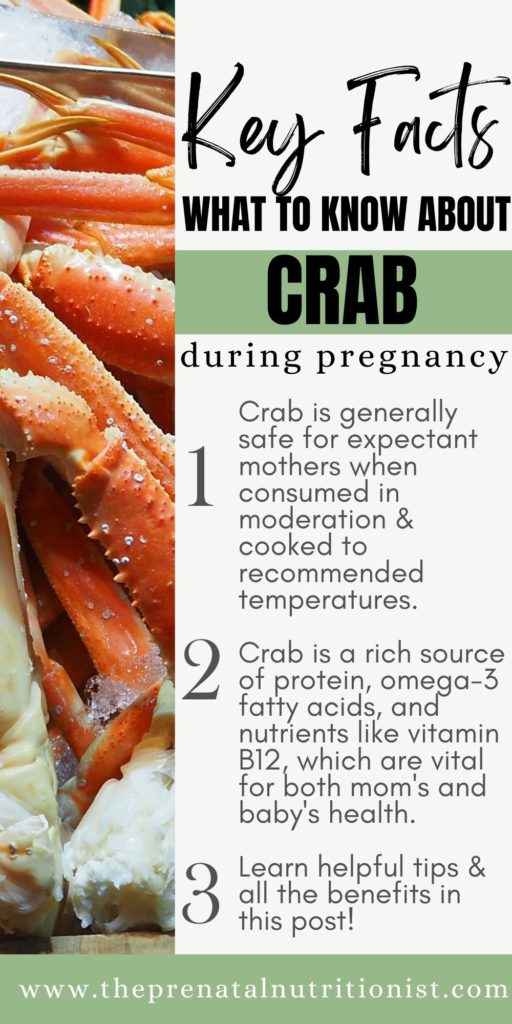
Pregnant people can safely enjoy the benefits of eating crab meat during pregnancy.
Crab is a rich source of protein, omega-3 fatty acids, and nutrients like vitamin B12, which are vital for both mom’s and baby’s health. There are many low-mercury crab varieties to choose from, like blue crab or king crab. Ensure the crab is thoroughly cooked to reduce the risk of foodborne illness. Imitation crab can be consumed in moderation too. However, it does not provide the same nutritional value as real crab.
For more on which seafood options are safe to consume during pregnancy, click here and check out The Prenatal Nutrition Library! Inside the library, we have detailed guides on mercury, low-mercury fish, tuna, salmon, salmon roe, and HUNDREDS of other pregnancy nutrition topics! It’s your one-stop shop for quick, evidence-based answers so you know what you eat is safe.
Until next time, keep food safety in mind, and feel free to enjoy crab in your pregnancy diet.
